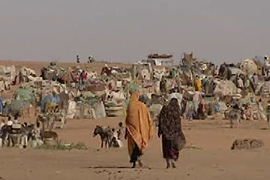Misery of Darfur’s displaced
Food shortages and overcrowding await desperate refugees.

 |
|
Conditions are cramped for the nine |
Khatir and Hawa Hassam fled their village in Darfur four months ago, but while they have escaped the fighting near their home they and their family now face a new set of challenges.
The Hassams are among the 20,000 displaced people who have arrived at the el-Salam refugee camp in North Darfur since July.
The camp on the outskirts of el-Fasher, the nearest large Darfuri city to the Sudanese capital, Khartoum, is almost full and already there are insufficient resources to look after so many people.
It is one of many such facilities that are unable to cope with the flood of refugees from a conflict that has so far left an estimated 200,000 people dead from fighting, disease and malnutrition in the Western region of Sudan.
Tough start
Fighting between local tribes and the government-backed Janjaweed militia has been going on for three years and has resulted in the displacement of about 1.85 million people.
It is especially hard for new families coming to el-Salam and in the midday heat the latest arrivals use whatever they can find to protect themselves from the sun.
Khatir and Hawa ran away from their village of Aridjanji four months ago after seeing aircraft overhead and hearing the sound of explosions near their home.
 |
| Conditions are oppressive in the camps |
“It was in the afternoon when our village was bombed. We were afraid for our lives and ran away from the place,” Khatir said.
“Now we sleep here. It is not nice living like this but at least there is no fighting here – for now we are safe.”
Even though things may seem relatively safe in the camp, the family now has other problems to face.
Small comforts
All nine of them sleep on the ground under a shelter made out of sticks and sheets.
While it is hot during the day, it is very cold at night and the family has only one blanket.
Everyone in the Hassam’s part of the camp shares the same kitchen and toilet. The only good thing about this is that water is only 200 metres away.
Given that Darfur is experiencing one of its severest droughts in 50 years, that is no small matter. Such has been the shortage of water that there have been reports of fighting in other camps such as Kalma, the largest in the region, and about 1.5 million people are believed to depend on food aid.
However, despite the oppressive circumstances Hawa says she is trying to make camp-life as comfortable as she can for her family.
Looking after seven children is hard work at the best of times but in el-Salam it is immeasurably more difficult. One daughter fell sick just after they arrived in the camp and died shortly afterwards.
Hawa says does not understand why her people are fighting and that her “children have bad dreams at night”.
“They are scared they will bomb this camp too,” she sayd. “How can I comfort them if I do not know when the war will end and we can go home.”
Market sale
As if losing one daughter was not bad enough Hawa is now very concerned about her youngest son, Yaha, who has Downs Syndrome.
He needs more care than her other children, all of whom are under the age of 13.
But Hawa is doing her best under the circumstances. Her mother taught her how to make clay stoves when she was a girl and a good day for her is when she sells two of these at the local market for a dollar.
She says she misses her vegetable garden where there was always a supply of tomatoes, sorghum and okra to feed her children.
She keeps putting off starting a garden of her own in the camp as she says the ground is too dry.
The harsh plight of Khatir, Hawa and their children is mirrored by thousands of desperate families in el-Salam and other camps.
For now, this is their only option as they wait until it is safe to return home.